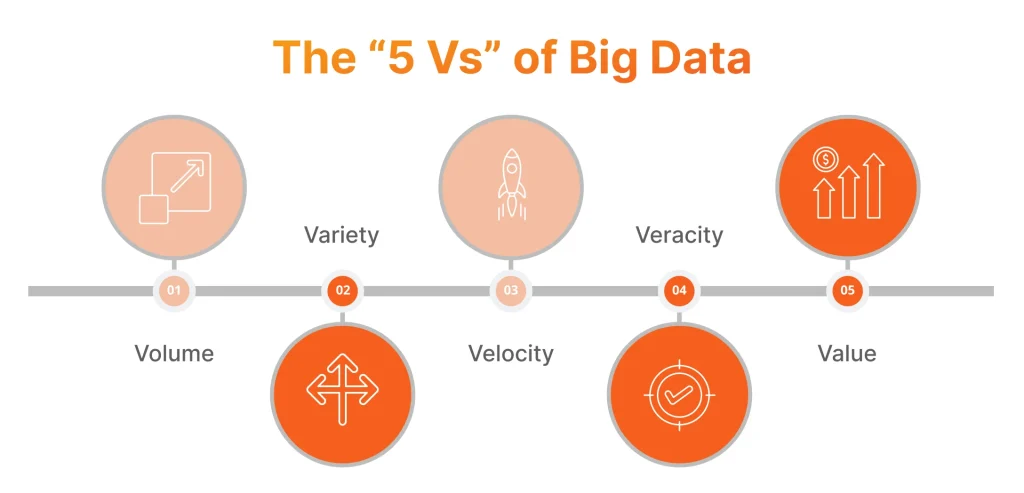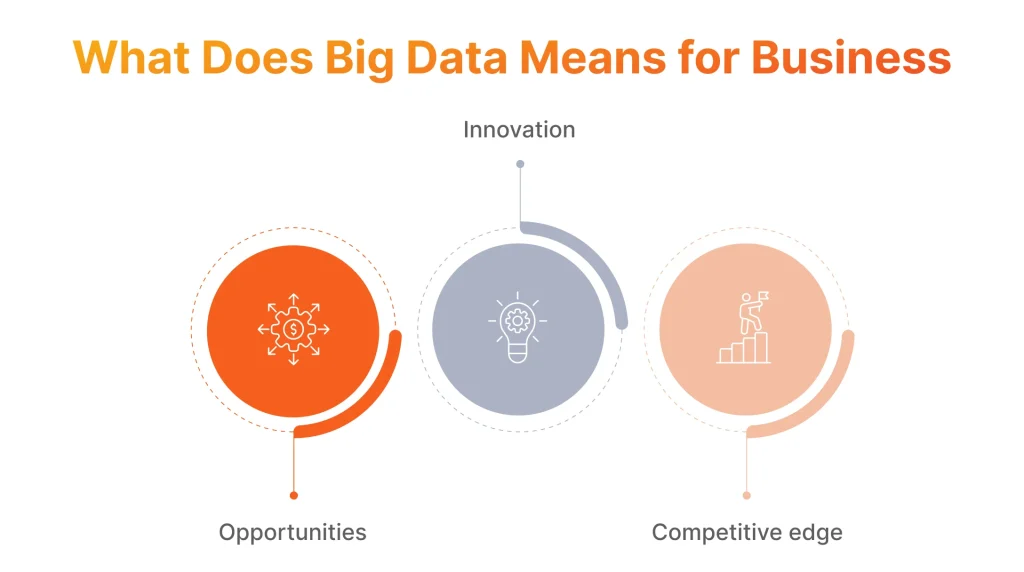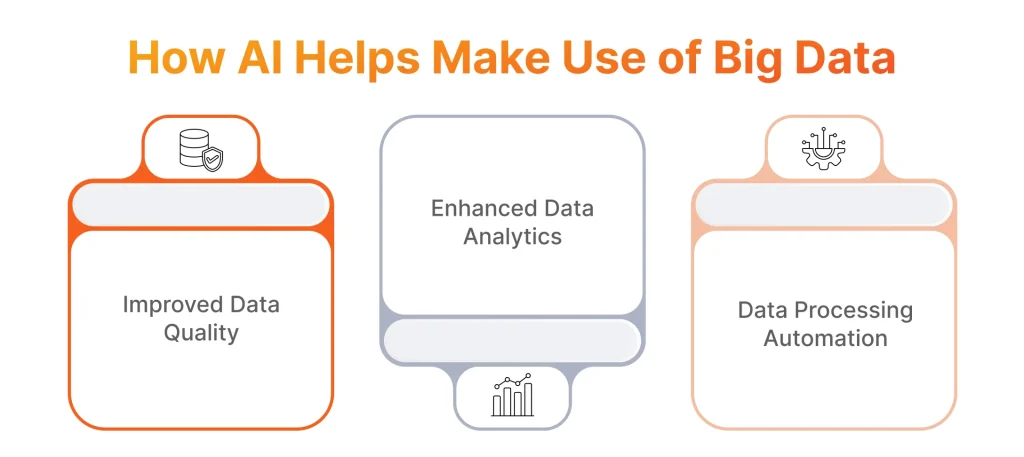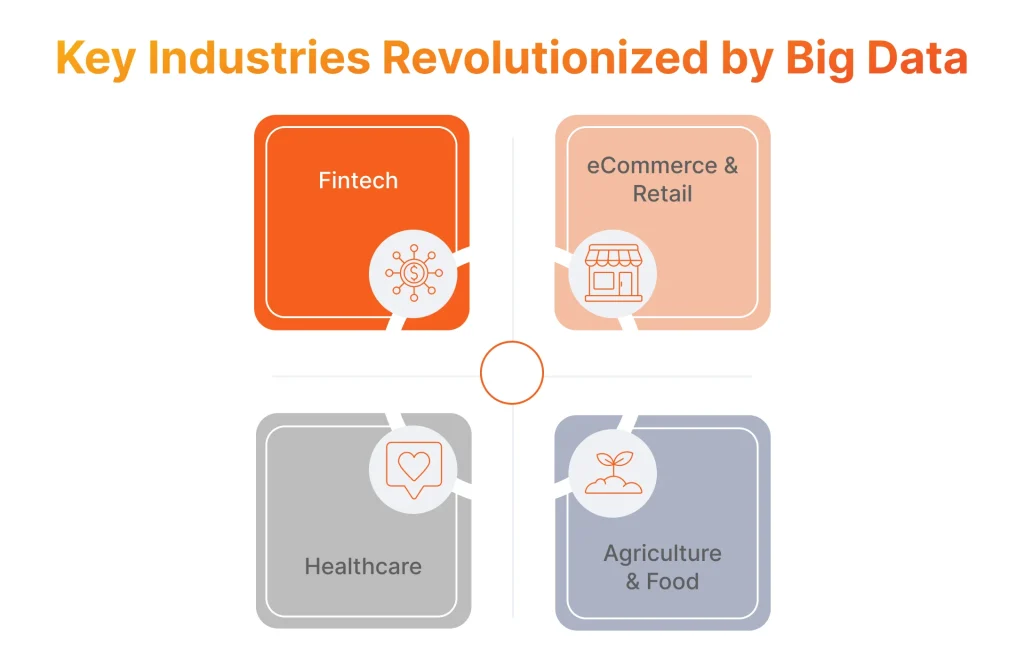In 2024, the importance of data for organizations is higher than ever before, as technologies like Big Data and Artificial Intelligence are disrupting the traditional ways of doing business. Big Data offers a strong foundation for analysis while adding AI to the mix helps to derive valuable insights from information and benefit from untapped opportunities to refine operations and boost overall customer experience.
Despite the obvious potential, many companies struggle to capitalize on this innovation. According to a study by Vena, 73% of companies are still wasting their time and resources on manual processes that can be easily automated with Artificial Intelligence and Big Data. At the same time, 80% of employees that leverage AI tools report significant productivity gains, if the report by All About AI is to be believed.
If you don’t fully grasp the Big Data impact on business, you are in danger of losing valuable opportunities and market positions. Hopefully, this article will help you to learn how has Big Data changed the world of business and how your organization can become more productive by using it.
What is Big Data?
Big Data is an extremely large dataset that can be considered complex, dynamic, and hard to fully process by using traditional approaches. It has a specific structure and the pace of generation, far different from usual data.

The defining characteristics of Big Data can be described by a “5 Vs” concept that includes:
- Volume: massive amounts of information from various sources are generated every second.
- Variety: inclusion of structured, semi-structured, and unstructured data of different types like texts, videos, and images.
- Velocity: real-time or close-to-real-time speed at which the data needs to be produced and processed to stay relevant.
- Veracity: ensuring high quality, accuracy, reliability, and trustworthiness of data.
- Value: possession of actual tangible benefits for an organization that may help to improve key processes.

Dmytro Tymofiiev
Delivery Manager at SPD Technology
“So, for the data to be considered “Big” it is crucial to meet most of these criteria. For example, if we talk about an e-commerce platform that collects information on sales weekly, it is not Big Data. However, when the same platform starts to collect millions of transactions per day, tracking a variety of parameters including customer behavior on the website, additional purchases, preferred payment system, product reviews, complaints and there is a need to process this information in real-time, then it would be safe to say that the company deals with Big Data.”
Why Is Big Data So Important?
While the global market for Big Data was estimated at US$185.0 Billion in 2023, according to Research and Markets, it will reach US$383.4 Billion by 2030, growing at a CAGR of 11.0%. Sure thing, there are several solid reasons for such rapid growth. Below are some of the main opportunities that Big Data and business implementations in real-world projects open up.
Global Connectivity and Collaboration
The advancements in using Big Data became a paradigm shift, completely transforming the ways organizations collaborate on a global scale. For example, using Data Analytics in retail allows companies in this industry to monitor emerging trends and share insights almost instantly with departments being scattered on different continents, ensuring that the right decisions will be made at the right time.
Transformational Impact Across Industries
Not limited to the retail industry, the impact of Big Data is felt in finance, healthcare, manufacturing, logistics, and many more. For instance, the usage of Big Data in predictive analytics in healthcare is improving patient outcomes and reducing hospital readmissions. By analyzing Electronic Health Records (EHRs), patient history, and lab results using advanced algorithms, healthcare providers can predict which patients are at a high risk of complications or readmission after being discharged.
The Emergence of New Business Models
The rise in Big Data volume and quality contributes to the emergence of new business models. Now, companies can monetize their data by offering Data-as-a-Service (DaaS) and selling their data to the organizations looking for customer insights, market trends and operational benchmarks. Consulting firms also increasingly turn their attention to Big Data opportunities, providing data-driven advisory services and supporting their strategic recommendations by data-backed insights.
What Does Big Data Mean for Business?
Simply put, it means change and disruption of traditional ways of doing business, driving innovation across the board. Below are the main values this technology delivers to companies harnessing it.

Opportunities
Using Big Data makes it possible to unlock detailed insights that wouldn’t be available otherwise, opening up new opportunities for exponential growth. McKinsey believes that if the Healthcare industry in the United States implemented Big Data initiatives to their fullest, the boost in efficiency and quality could result in more than $300 billion in value every year. According to the same report, Data Analytics in manufacturing and retail are also set to improve productivity and customer experiences, with Retailers that embrace the innovation potentially boosting their margins by over 60%.
Innovation
This is a key technology in fueling innovation and allowing businesses to deliver new products and services to change the world. Netflix is a great example, as the company saves nearly $1 billion per year by leveraging an innovative recommendation system powered by Artificial Intelligence and Big Data, which account for 80% of content consumption and is the core of the company’s business model if Exploding Topics is to be believed.
Competitive Edge
Data-driven strategies can become a deciding factor in winning over competitors in the modern world. Data Analytics in finance, healthcare, and retail can help companies stay ahead of the competition thanks to improved decision-making and highly personalized and timely offerings. According to a survey mentioned in the previous section, 1 in 4 business executives report profitability from their initiatives in Big Data, proving that this innovation is a very powerful market advantage. Read about the advantages of strategic technology consulting in our article, and find out more benefits that implementing innovation can bring to your organization.
The Potential of Artificial Intelligence and Big Data Combination
With the power of Artificial Intelligence, it is possible to leverage machine learning models to learn, make detailed analyses, and come up with reasonable decisions based on data. AI can extract patterns and make predictions from massive amounts of data that can be too complex or time-consuming for human processing. Simply put, the introduction of AI helps to make Big Data manageable and actionable.
Key Ways Big Data Can Benefit from AI

- Improved Data Quality: organizations with large datasets struggle with their data quality management and ensuring its consistency. AI can detect and correct possible errors and fill in missing information, cleaning, validating, and standardizing data automatically. While reliable and accurate information is vital in any industry, implementations of AI in supply chain are a great example of how accurate data ensures stable operations for the world’s leading companies including Amazon, Walmart, and Tesla.
- Enhanced Data Analytics: while proven traditional methods are reliable and might work great, there are still some aspects that they might miss. AI is here to fill this void and thanks to advanced machine learning algorithms, it is possible to identify hidden patterns and unobvious correlations, providing far superior insights, and in some cases predict future trends and outcomes.
- Data Processing Automation: probably one of the most prominent contributions of AI is its ability to automate mundane data processing tasks. Companies are typically struggling with data classification, organization, and summarization, so AI can help with this and save massive amounts of resources and time. Applications of machine learning in retail, in particular, allow automating customer segmentation, risk assessment, and fraud detection at a pace that humans could never match.
What Does the Advent of Large Language Models Mean for Big Data?
The Global Large Language Model (LLM) market size is set to skyrocket from $1,590.93 Million in 2023 to $259,817.73 Million by 2030, with a CAGR of 79.80% during 2024-2030, according to Pragma Market Research. This growth will undoubtedly impact the world of Big Data as well, as continuously improving the ability of LMM to understand natural language and generate human-like text has several major applications in Big Data.
- Data Analysis Automation: with the addition of LMMs, it is possible to streamline and automate the process of textual data analysis. It is one of the most useful applications of generative AI in eCommerce, for example, as it allows seamless analysis of large amounts of customer reviews, social media posts, and reports. This analysis includes highly effective extraction of actionable insights for faster decision-making and market response.
- Enhanced NLP: LMMs unlock entirely new levels of NLP capabilities for AI systems, allowing more nuanced sentiment analysis than ever before, as well as the ability to generate highly detailed automated reports and responses to customers. The customer service area is where LMMs truly shine, as combined with Big Data, they can handle massive volumes of customer queries and offer highly personalized responses.
- Synthetic Data Generation: LMMs have the capabilities to create synthetic data that closely mimics real-world data. This can be used for the training of machine learning models. It is one of the ways generative AI transforms healthcare, as in this particular industry, there is a lot of sensitive patient data that can be restricted due to privacy concerns.
- Improved Data Exploration and Knowledge Extraction: Finally, LMMs can democratize access to data, offering intuitive data explorations and providing access to complex knowledge through simple conversational queries.

Dmytro Tymofiiev
Delivery Manager at SPD Technology
“Based on our experience, at this moment, the biggest advantage of Large Language Models for organizations is their ability to unlock even deeper insights in unstructured data sources, surfacing valuable patterns, trends, and correlations that was previously buried in bottomless data lakes. If you want to truly embrace the potential of Artificial Intelligence and machine learning, you should heavily consider implementing some kind of LLM as well.”
Impact of Big Data on Business: How Big Data and AI Transform the Industries
As previously mentioned, Big Data and AI are reshaping the traditional ways of doing business, and in some cases, helping to create entirely new business ventures. In this section, we will focus on the most interesting real-world use cases and what exact value they bring to the organizations.

Fintech
Big Data and its business impacts are especially felt for credit card fraud detection using machine learning, advanced risk assessment approaches, and tailored customer experiences. Just like other industries, processing massive amounts of information in real-time opens up the possibilities for predictive analytics solutions, making decisions more accurate. For example, Credit Karma is an innovative platform that leverages AI-powered Big Data to offer highly personalized financial recommendations and credit scores, based on rigorous analysis of the user’s financial behavior and history. Still, these aren’t all the benefits these technologies open up for financial service businesses:
- Enhanced Security: these technologies allow financial institutions to analyze vast amounts of transaction data almost instantly, detecting suspicious activities and preventing fraud.
- Market Expansion: predictive analytics can be used for identifying market trends and customer behaviors that can lead to developing new products and services catering to entirely different target audiences.
- Risk Mitigation: with the aggregation of data from multiple sources, ML models can be trained to predict loan default risks and market fluctuations, significantly helping organizations lower potential losses.
- Asset Management and Investments: due to the ability to analyze market data in real-time, firms can identify promising investment opportunities, accurately predict asset performance, and make necessary adjustments to investment portfolios to maximize results while minimizing risk.

Dmytro Tymofiiev
Delivery Manager at SPD Technology
“We have been helping our clients in the Finance industry with groundbreaking solutions for 18+ years, and implementation of Artificial Intelligence, Big Data, and Intelligent Automation is always a big part of our projects. Sophisticated Fraud Detection and Risk Mitigation systems are one of the most popular solutions we build, and with AI and Big Data combination, we successfully deliver software for leading global companies that’s able to monitor transaction anomalies in real-time, significantly reducing risks and minimizing fraud. So, based on our experience, Finance, and Banking are probably the two industries that can benefit from AI and Big Data the most.”
eCommerce and Retail
Specific use cases for these industries we should mention are personalized marketing and dynamic pricing, which are possible due to predictions of customer preferences. As for identifying and predicting them, Stitch Fix is a company that succeeds with this task. The brand offers personal styling for men, women, and children, sending clothing to their doors with free shipping and returns. At the core of their business model is an AI-powered engine that processes vast amounts of Big Data and curates closing boxes tailored to individual customers.
eCommerce supply chains can also benefit from the integration of AI and Big Data, enabling the accurate prediction of demand fluctuations. With the help of advanced solutions, eCommerce and retail companies can reduce stockouts and optimize shipments, improving overall cost efficiency.
Below are some more benefits of using AI and Big Data for retail:
- Improved Customer Experience: with AI and Big Data, it becomes possible to deliver hyper-personalized customer experience, far superior to anything that was done before, increasing satisfaction for customers and conversions for the marketers.
- Higher Marketing ROI: Big Data and AI revolutionize marketing by analyzing customer data to uncover patterns, predict behaviors, and personalize campaigns. With AI-powered algorithms, companies can segment audiences more precisely, delivering targeted ads and content based on real-time insights. Predictive analytics helps marketers forecast customer trends, optimize pricing, and improve customer retention strategies.
- Increased Sales: significant improvement in customer experience as well as marketing efforts undoubtedly leads to a boost in sales, dramatically increasing profitability.
Healthcare
The more technology evolves, the more AI and Big Data change healthcare, presenting even more opportunities to enhance patient care, improve treatments, and elevate medical research initiatives. The technological combination also helps with the management of hospital resources and the invention of new drugs, along with other significant advantages:
- Enhanced Patient Care: with the capabilities of Big Data, it is possible to aggregate and analyze massive amounts of information from Electronic Health Records (EHR), while AI can suggest personalized treatments to match every unique health history.
- Improved Patient Outcomes: AI has already evolved to the stage where it is capable of detecting diseases early through the analysis of medical images. With the scale of Big Data, it is possible to analyze large datasets of those images, over performing traditional methods of medical image analysis.
- Innovative Medical Research: the processing capabilities of AI and Big Data also lend a hand in the analysis of genomic and clinical data, providing pharmaceutical companies with the ability to develop treatments faster.
To give an example, the IBM Watson Health is one of the top solutions for the healthcare industry, helping medical services providers make only evidence-based decisions. Watson assists medical experts in developing personalized treatments by analyzing an enormous amount of medical literature, clinical trial data, and patient records.
Agriculture and Food
Probably, one of the most important use cases of machine learning and AI in the Food Industry is overall optimization of farming operations, resulting in more sustainable farming practices. Farmers across the globe are already leveraging AI tools to monitor weather, soil health, and water usage. Adding Big Data to the mix only increases the scale and pace at which these operations can be completed, in addition to other undeniable advantages for the industry:
- Increased Productivity: take precision agriculture as an example, as AI-driven solutions allow farmers to have insights into the best planting times, irrigation schedules, and fertilization needs.
- Waste Reduction: optimizing supply chains leads to the reduction of overproduction and food waste, and helps farmers to use their resources most efficiently.
- Enhanced Sustainability: with the help of AI-powered predictive models, it is possible to monitor soil health and pest infestations, reducing the need for harmful chemicals and conserving natural resources.
For instance, Climate FieldView is a data partner that allows its clients to seamlessly collect, store, and visualize critical field data, as well as monitor and measure the impact of agronomic decisions. In particular, the solution analyzes data on soil conditions, weather, and crop performance, allowing farmers to make informed decisions on planting, irrigation, and fertilization, resulting in more efficient and sustainable farming practices.
Speaking of the Food Industry, we welcome you to read about our project for liquid packaging board and market pulp manufacturer with 70+ years of history.
Artificial Intelligence for Big Data – The Nearest-Future Implications
Big Data and Artificial Intelligence’s impact on business continues to make its mark in the industries. It drives changes in business models and interactions with customers, helps to predict customer behavior with Artificial Intelligence, boosts decision-making processes, solves legal challenges, and improves environmental sustainability. Let’s take a look at the most captivating trends.

Emergence of Data-Driven Business Models
Without a shadow of a doubt, one of the trends to watch is the rise of data-driven business models, when companies no longer use information just for their insights, but rather monetize it by offering it to customers. Google and Amazon are already pioneering this trend by popularizing the Data-as-a-Service (DaaS) model, and it is fair to expect the emergence of businesses that solely focus on extracting predictive insights for other organizations.
We, at SPD Technology, are offering AI consulting services that will help you understand how to seamlessly integrate DaaS in your business, uncovering the full potential of this model.
AI-Powered Customer Interactions
This is another trend worth mentioning, as while AI-powered customer interactions are already widely used by companies that leverage Robotic Process Automation (RPA) development services, we can expect fully AI-driven hyper-personalized experiences in the future. Advanced Data Analytics in e-Commerce and other industries will open opportunities to not only predict customer preferences but rather anticipate customer needs before they arise. With this level of sophistication of AI models, interactions with them may become so natural that human experts will no longer be needed for most of the operations.
If you are planning to tap into the transformational opportunities offered by Big Data and AI, consider learning more about creating a data strategy framework in our recent article with best practices.
Real-Time Strategic Adjustments
We are on the verge of another interesting trend, as businesses soon are to be expected to change their strategies on the fly by using continuous streams of data combined with AI-driven predictive capabilities. Finance giant Goldman Sachs already uses AI to analyze market information in real-time to make lightning-fast trading decisions that influence the further evolution of the company. With these in-depth analytics capabilities, it will be possible to shorten the decision-making cycles from months to mere seconds, reacting to market changes based on proven information.
Data Sovereignty Challenges
As international usage of data only expands, data sovereignty will become an even bigger challenge than it already is. There are several major regulations, such as GDPR in Europe, that require businesses to process and store data within certain jurisdictions. Leaders including Microsoft and Facebook are already working on ways to comply with these regulations while ensuring the highest efficiency of Big Data. Other organizations will have to build a data strategy to adhere to all regulations and requirements.

Dmytro Tymofiiev
Delivery Manager at SPD Technology
“We, at SPD Technology, are constantly keeping track of Big Data and AI Innovations, and implement them in real-life scenarios, helping our clients to remain on the cutting edge of technology. Speaking from our experience, whether you want to integrate Data-as-a-Service models or create real-time, AI-driven strategies, it will be a good idea to prioritize scalability right from the start. Business needs change, as well as data volumes and even regulatory requirements, so I think, it is vital to keep scalability in mind while implementing any innovation.”
Unlocking the Opportunities of Artificial Intelligence for Big Data with SPD Technology
Our expert 600+ team has proven experience in using Big Data and AI to transform large datasets into actionable insights for global companies. The solutions we create not only streamline business operations but also have great predictive capabilities and offer outstanding customer experiences. Here are some of our latest case studies, that prove the value of our involvement.
Transforming HaulHub, a Transportation Construction Leader
Business Challenge
HaulHub is a B2B2C company providing a digital platform for the transportation construction industry, which asked us to develop a set of new functionalities. HaulHub was looking for assistance in expanding its mission-critical software platform. We have augmented their in-house team to support the development of all the platform’s components.
SPD Technology Approach
As for the data-related part of the project, we began by overhauling the DOT Slip component, starting with a thorough code analysis and improving its quality. After that, our team integrated internal and third-party data sources, creating seamless data flows and scalable pipelines capable of managing large volumes of projects and eTickets. Custom data visualization tools were built using React.js, Chart.js, Recharts, and Mapbox to deliver actionable insights.
For the SupplierCI component, we optimized PostgreSQL performance with data denormalization and caching, managing data integration via AWS Database Migration Service and custom ETL processes.
On the AI/ML side of the project, our team utilized AWS Lambda for API development and integrated models such as OpenAI’s ChatGPT and AWS Bedrock’s AI services for NLP, summarization, content generation, and chatbot interactions. The Retrieval-Augmented Generation (RAG) approach was used to improve chatbot performance.
Value Delivered
- Optimizing the Entire Transportation Construction Ecosystem: we developed an all-in-one solution for HaulHub that unifies the processes of agencies, contractors, vendors, and suppliers, ensuring smooth collaboration and alignment among all stakeholders.
- Overhauling Existing Infrastructure to Handle Large Datasets: our data engineering efforts focused on the development of scalable data pipelines, the implementation of a robust Data Lake, and the integration of third-party systems.
Overall, SPD Technology helped HaulHub to successfully develop a highly efficient platform that handles large sets of data and is capable of processing millions of data points in under two seconds with comprehensive UI/UX design and advanced implementation of AI. This is a great example of AI-powered Data Analytics in Construction.
Developing Custom AI-Powered Software for a Leading Financial Services Provider
Business Challenge
Morningstar, Inc., one of the premier asset management companies in the United States, was looking to develop several major products: an AI/ML-powered Web Crawler application, a Data Collection application, and the Kessler Application that allows users to create watch lists for tracking the performance of stocks before their purchase.
SPD Technology Approach
To deal with the main challenges in developing the Web Crawler app, our team decided to leverage our deep AI/ML expertise. So, we prepared a data set for further model training to begin the development process. To solve the challenge of the irrelevant information that contained target keywords, we came up with sophisticated AI/ML (Doc2Vec and Word2Vec) models. We also employed AI and ML algorithms to help reduce the amount of data to be processed by the client’s employees weekly as well.
As for the Data Collection application, the client already had an app developed by another vendor, but it failed to comply with current business demands. Our team made an audit of the existing app and almost completely redesigned it. This allowed us to rule out 90% of the possible data losses and significantly sped up the performance. We also redesigned and dramatically expanded data annotation functionality, implementing GUI according to the client’s requirements.
Finally, after making sure the cloud computing infrastructure benefits meet the client’s business needs, we completely overhauled the client’s Kessler App into a full-blown cloud application. By skillfully leveraging the potential of AWS, we’ve achieved the required high-load capacity and significantly increased the system’s processing speed.
Value Delivered
- Automating Core Business Lines: our team created an AI/ML-powered application for financial data crawling and retrieval from multiple websites.
- 10x Data Storage Cost Reduction and Data Processing Time Optimization: we improved data storage architecture and reduced the time necessary for manual data analysis from days to hours.
Overall, SPD Technology helped Morningstar, Inc. to automate the data collection process and optimize operational efficiency with innovative cloud-based products that fully leverage the capabilities of AI/ML and data analysis.
Developing an AI Solution and Data Strategy for P2P Lending Platform
Business Challenge
The client is a lending company focused on creating a personalized and more efficient lending experience. We were asked to streamline data integration and quality management, build a data warehouse from scratch, implement AI-powered Analytics and Dynamic Risk Profiling, as well as create a scalable AI infrastructure to handle increasing data volumes.
SPD Technology Approach
Our team established a strong data governance framework to ensure data ownership, quality, and compliance with the client’s business goals and regulations. A strategic plan was then developed to integrate various data sources, including traditional and alternative data, with rigorous quality metrics in place to ensure accuracy and consistency. Next, we designed a data warehouse schema for structured and unstructured data, ensuring long-term trend analysis and secured user access. Real-time data pipelines and AI models were deployed to provide dynamic risk profiling and real-time analytics. Finally, we implemented fairness and transparency measures, using techniques like LIME and SHAP to detect bias and ensure model trustworthiness.
Value Delivered
- 40% Reduction in Data Inconsistencies: our team implemented data quality standards led to a massive reduction in data inconsistencies and errors, enhancing the exceptional reliability of AI/ML models.
- 60% Improvement in Query Speed: by leveraging performance techniques like indexing and partitioning, we significantly improved the speed of queries and data retrieval operations.
Overall, SPD Technology helped the client enhance real-time loan matching and risk profiling, delivering a tangible advantage over competitors and setting up this P2P lending platform for long-term market success.
Conclusion
The transformative impact of AI and Big Data impact on business is undeniable, as these technologies enable organizations to truly elevate customer experience, optimize core operations, and enable smarter decision-making based on data. As the AI market is expected to reach $407 billion by 2027, it is safe to say that the companies that will embrace the innovation will position themselves for success in a tech-driven competitive market.
We know how to fully benefit from the potential of Artificial Intelligence for Big Data. Our professional approach to data strategy consulting services delivery will help transform your company’s data into a tangible business asset, positioned to increase revenue and drive sustainable growth.
FAQ
What is the impact of Big Data on business?
With the help of Big Data, organizations can make data-based decisions, streamline operations, and elevate customer experience to an entirely new level. The businesses gain an opportunity to analyze massive volumes of information and, thanks to the combination of Big Data and AI, identify possible future trends, predict possible business outcomes, and determine inefficiencies in the current processes.
How is Big Data changing business?
Probably the biggest impact of Big Data on business is felt in the realm of deeper insights into key areas, including customer habits, market trends, and internal processes of organizations. Big Data implementation can transform a traditional organization completely, turning them into agile, future-ready companies that will stay ahead of the competition.
How does Big Data play a role in improving businesses?
Big Data opens up never-before-seen opportunities by unlocking actionable insights for the organization that can be used for optimizing every aspect of the business, from more precise marketing campaigns to more cost-effective supply chain management.
What is Data Analytics and its impact on business?
Data Analytics is a process that allows uncovering hidden correlations and patterns in large datasets. By using this, businesses can predict opportunities and risks and drive innovation to gain better market positions and significantly increase revenues.



